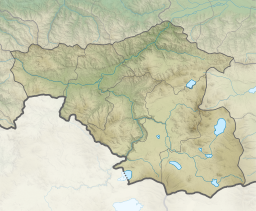Madatapa Lake
| Madatapa Lake | |
|---|---|
 | |
 Madatapa Lake | |
| Coordinates | 41°10′46″N 43°46′59″E / 41.17944°N 43.78306°ECoordinates: 41°10′46″N 43°46′59″E / 41.17944°N 43.78306°E |
| Native name | მადათაფა (Georgian) |
| Primary outflows | |
| Catchment area | 136 km2 (53 sq mi) |
| Basin countries | Georgia |
| Surface area | 8.78 km2 (3.39 sq mi) |
| Average depth | 1.5 m (4 ft 11 in) |
| Max. depth | 1.7 m (5 ft 7 in) |
| Water volume | 97 km3 (23 cu mi) |
| Surface elevation | 2,108 m (6,916 ft) |
| Designated | 8 July 2020 |
| Reference no. | 2435[1] |
Madatapa Lake (Georgian: მადათაფა) is a lake in the Samtskhe-Javakheti region of southeastern Georgia, near the border with Armenia, north of Bavra. Covering an area of 885 hectares (2,190 acres) at an elevation of 2,108 m (6,916 ft), the lake is noted for its Paravan race of common carp and has been considered as a commercial fishing production site.[2] It is found in one of the most earthquake-prone areas of the Caucasus.[3] A shallow lake, it, along with , is one of the most important in the country for breeding and staging waterbirds, including the endangered Dalmatian pelican.[4] Since 2020 it has been designated as a protected Ramsar site.[1]
The villages of , , and Sameba lie around the lake. Biketi Lake lies to the north.
See also[]
References[]
- ^ a b "Madatapa Lake". Ramsar Sites Information Service. Retrieved 5 October 2020.
- ^ Petr, T. (1999). Fish and fisheries at higher altitudes: Asia. Food & Agriculture Org. p. 298. ISBN 978-92-5-104309-7. Retrieved 6 October 2011.
- ^ Savarenskiĭ, E. F; Kharin, D. A; Gubin, Igor'Evgenèvic (1 January 1962). Earthquakes in the U.S.S.R. U.S. Atomic Energy Commission, Division of Technical Information, available from the Office of Technical Services, Dept. of Commerce, Washington. p. 282. Retrieved 6 October 2011.
- ^ Evans, M. I.; Heath, Melanie F. (2000). Important bird areas in Europe: priority sites for conservation. BirdLife International. p. 255. ISBN 978-0-946888-35-1. Retrieved 6 October 2011.
Categories:
- Lakes of Georgia (country)
- Ramsar sites in Georgia (country)
- Geography of Samtskhe–Javakheti
- Georgia (country) geography stubs

